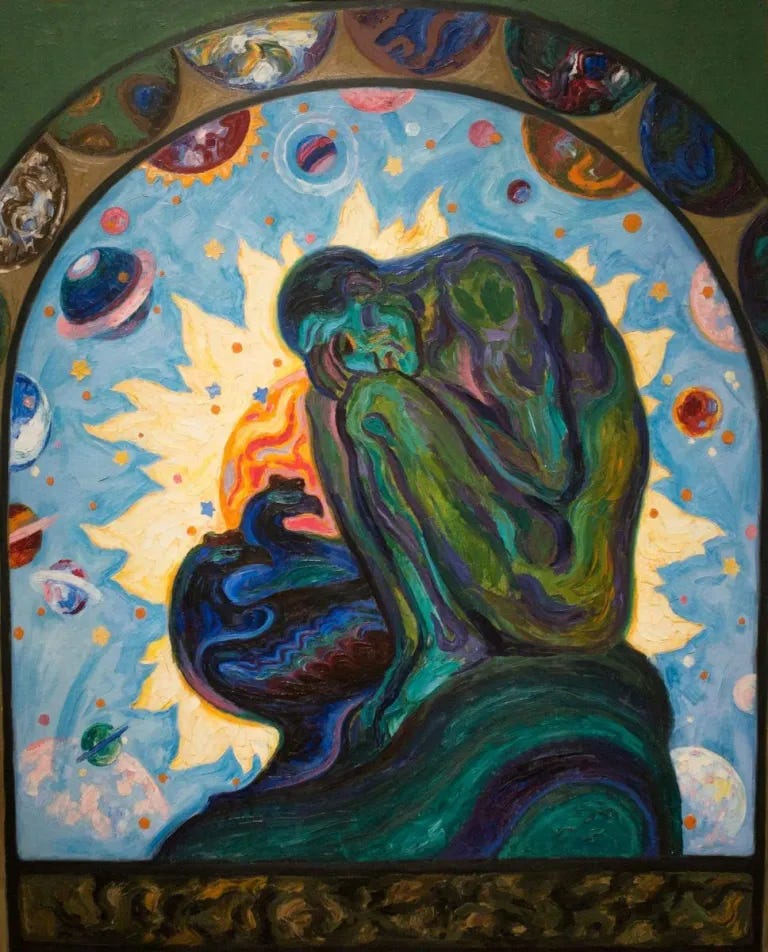How To Have Peace
Siddhartha offers you a user interface for the mind
This essay will not bring you peace. Reading a certain book will not bring you peace. Following someone else’s teachings will not bring you peace. You can have guides but not teachers. You are unique. You have a distinctive experience of life. Only you can figure out how to have peace. You, for yourself.
This is the lesson embedded in Hermann Hesse’s classic novel Siddhartha.
At the beginning of the story, young Siddhartha leaves home and becomes a wandering ascetic. He says no to all worldly pleasures, instead dedicating himself to fasting and meditation in pursuit of enlightenment.
After doing this for some time, our hero makes a profound realization—he observes that what the drunken man seeks at the bar in his drink is the same thing the contemplative man seeks in his meditative practice. They are both seeking peace. But more specifically, they are not seeking what is commonly called peace of mind, but rather peace from mind. They are seeking to quiet their internal monologue—to press mute on the torment we inflict on ourselves with our minds.
I first learned this distinction from The Almanack of Naval Ravikant. Peace from mind is what we pursue through sex, flow states, or drugs. We seek moments where our own running thoughts are no longer driving us mad.
But many of the most popular ways to experience peace from mind are bad for your health. Despite giving you a brief relaxation, they eventually make not just your running thoughts but everything in your life more painful. Alcohol, for example, is great at providing momentary psychological relief. But like many other cheap dopamine activities, the reality is that it is only increasing your suffering in the long term.
Siddhartha knew this type of suffering. When he became disillusioned with the hardcore ascetic lifestyle, not wanting to follow teachers or conform to their dogmatic religious ways, he left the group and went on a journey alone. One day, he came upon a town where he met a beautiful woman named Kamala. She began to teach Siddhartha the ways of sensual pleasure which he had so long denied himself. She also introduced him to a rich merchant. The rich merchant hired Siddhartha, and he grew wealthy. With all his money he started to gamble and drink wine, and then more wine. Maybe all these activities would bring him peace.
Wrong. Years pass, and through the dice and the bottle, Siddhartha continues to stimulate his senses until they become so insensitive that, if he wants to still feel pleasure, he must have stronger and stronger stimulants. That, boys and girls, is the reliable path to hell. Emotionally poisoned by his reckless hedonism, he leaves the city, even contemplating suicide, before deciding to go live a simple life by a river.
When he gets to the river, he begins living with a ferryman he had met years earlier during his wandering. The ferryman does not impose any teachings on Siddhartha. But through his example, Siddhartha comes to learn what the ferryman—who is actually enlightened—learned from the river. Siddhartha realizes he never needed to be an ascetic or a rich businessman or anything in between. He never needed any teachers or anything external. He needed a deepened awareness in the present moment. In listening more and more to the river, Siddhartha comes to understand this, as well as the unity of all nature, and experiences a deep sense of love and peace.
The river, which helped Siddhartha achieve this state of bliss, is also a useful metaphor for the human mind. You—your consciousness—is not a solid, hardened thinker, but more like a flow of continuous ever-changing thoughts, a stream. How helpful or unhelpful, wise or unwise, pleasant or unpleasant the water is largely depends on the quality of your inputs and the quality of your habits. And while recognizing that some of the best moments in life really are when we experience peace from mind, it would be foolish to view our mind as the enemy. Our thoughts are neither our friends nor our enemies. They are just thoughts. They are passing contents of consciousness. It is the attachment and identification with these thoughts that leads to psychological pain. Your own mind cannot torture you when you know how it works.
But even that knowledge cannot teach you a feeling of peace. The wisdom in the story of Siddhartha is nearly infinite—to have peace, you can search for it through living different lifestyles in different places, studying ancient philosophies and reading essays like this one, but ultimately, you must learn it yourself. It must come from inside you.



Or as Kramer did, just say serenity now
Nice article Jeff! Very concise and to the point. I haven’t read siddhartha, would you recommend?